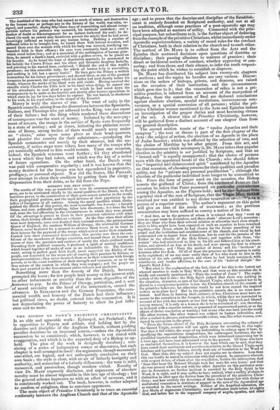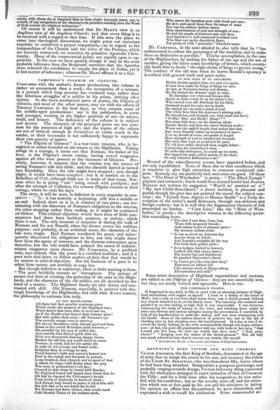THE BISHOP Or DOWN'S PRIMITIVE CHRISTIANITY'
Is an able and agreeable work : Episcopal, not Prelatical ; firm in opposition to Popery and schism, and holding fast by the doctrine and discipline of the Anglican Church, without pushing peculiar doctrines to an irrational extent,—unless the Apostolical succession be so considered ; which, however, is not stated with exaggeration, and which it is the expected duty of a Bishop to up- hold. The plan of the work is designedly desultory ; con- sisting of a series of independent essays or discourses, but each chapter is well-arranged in itself: the arguments, though necessarily one-sided, are logical, and not unfrequently conclusive on their own basis ; the style is clear, with an air of fatherly benignity and authority, and somewhat of a fatherly diffuseness : the tone is mild, measured, and passionless, though resolute withal. Novelty of view Dr. MANT expressly disclaims, and arguments of absolute novelty must be almost impossible in this late age of theology ; but the general scheme impresses us with an effect of newness, and it is consistently worked out. The book, however, is rather adapted to confirm or enlighten, than to convince opponents. The main object of Primitive Christianity is to trace an essential conformity between the Anglican Church and that of the Apostolic
, - age ; and to prove that the doctrine and discipline of the Establislt- ment is entirely founded on Scriptural authority, and not at all on tradition, although some practices of a post-apostolic age may have been adopted as matters of utility. Connected with the prin- cipal purpose, but subordinate to it, is the further object of deducing from the example of the primitive Christians, whilst immediately under Apostolic superintendence, a variety of moral rules for the conduct
of Christians, both in their relation to the church and to each other. The method of Dr. MART is to collect from the Acts and the
Epistles their scattered decisions upon questions of doctrine or discipline ; their passing allusions to matters of practice ; their direct or incidental notices of conduct, whether approving or cen- suring ; and from these, and their silence, to infer the truth respect- ing the point which he wishes to establish or disprove. Dr. Mmix has distributed his subject into twenty-six chapters or sections; and the topics he handles are very various. Discus- sions on the orders of bishops, priests, and deacons, are raised on the occasion of their institution, and the circumstances which gave rise to it ; that the veneration of relics is not a pri- mitive practice, is inferred from an account of the martyrdom of Stephen ; from the conversion of Saul are deduced conclusions against absolute election, special revelations, instantaneous con- versions, or a special conversion of all persons ; whilst the pri- mitive Christian women mentioned in the Acts and Epistles induce an investigation of the proper duties and most becoming virtues
of the sex. A clearer idea of Primitive Christianity, however, will be gathered from a distinct account of one chapter than from any general description.
The second section treats of the " twelve Apostles and their company " ; the text or theme is part of the first chapter of the Acts : the subject of action, the election of an Apostle in the place of Judas Iscariot ; which was effected by the selection of two, and the choice of Matthias by lot after prayer. From this act, and
the circumstances which accompany it, Dr. MANT infers that popular election to the ministry is not justified by Scripture, and that an "inward call" is equally unsupported : that the choice of persons
rests with the appointed heads of the Church ; who should follow the "impartial and disinterested spirit" manifested by the Apostles on that occasion, of choosing persons for their qualities and peculiar
utility, not for "private and personal predilection " ; although the election of the particular individual is no longer to be committed to lot. From the form of prayer used on the occasion, the Bishop asserts the godhead of Christ ; from the conduct of Peter on that occasion he infers that Peter possessed no particular preeminence , among the Apostles, as the Papists hold ; and he also deduces from a general view of the rest of Scripture, that the Virgin Ntary teith# received nor was entitled to any divine veneration ortl..-1.-1!4p.-att a - person of a superior nature. The author's argument on this point will give an idea of his mode of treatment ; as the previous enumeration may have sufficed to convey a notion of its form.
" And first, as to the persons of whom it is related that they 'went up into an upper room in Jerusalem, and there abode' after our Lord's ascension : they are those who from their natural relation or otherwise most close attach- ment to him, might have been expected on such an occasion to have remained together,—the eleven, whom he had chosen for the future preaching of his gospel and the institution and establishment of his church, and whom he had commanded not to depart from Jerusalem, but to wait for the promise of the Father in the effusion of the Holy Ghost ; and together with these, 'the women' who had ministered to him in his life and followed him at his cruci- fixion, and attended on him at his death, and were among the first to witness his resurrection ; and 'Mary the mother of Jesus,' and his 'brethren' or kinsmen after the flesh. Of all of these the presence on this occasion is easily to be explained; of no one more easily than of her who stood to him in the relation of his sole earthly parent, and whom he had lately consigned, with considerate and tender affection, to the care of his 'beloved disciple' the Apostle Saint John. " But what is the explanation of the fact, that of her this is the lastest act whereof mention is made in Holy Writ, and that even on this occasion she is briefly and cursorily mentioned as 'Mary the mother of Jesus ' ? The expla- nation of the fact is this : the Holy Spirit judged that there was nothing in the situation, character, or acts of the blessed Virgin, which required her to be placed in a conspicuous position before the Christian church in the records of the primitive believers; for otherwise would he not have caused the inspired writers so to place her? But in the primitive records she is no more men- tioned. And thus, in forming their estimate of her, Christians must have re- course to the narratives in the Gospels, in which, whilst they are instructed to account of her with due respect, as one that was highly favoured, and blessed among women,' it is only as a woman she is to be accounted of: not, therefore, as invested with a superior nature, or possessed of supernatural power, or as the object of divine veneration or worship; but as one who was born into the world like other women, like other women was subject to human infirmities, and, after a secluded, obscure, and undiscoverable course, was, like other women, con- signed to corruption in the grave. " From the future silence of the Holy Scriptures concerning the actions of the blessed Virgin, occasion will not again occur for reverting to this topic. Nor does it fall within the scope of my undertaking to enlarge upon it here, by specifying the superstitious imaginations, the extravagant devotions, the un- paralleled impieties and blasphemies, which were introduced concerning her in a later age, and have been maintained even to the present. Of those who have so conducted themselves, it is however the least which can be said, that they have rested their sentiments and practices in relation to the blessed Virgin upon fabulous and legendary fictions, utterly destitute of foundation in the 'Word of God. More than this my subject does not require me to observe. Less than this can hardly be stated in connexion with that subject. In pursuance whereof, with respect to her, of whom after the crucifixion, besides the information that from that hour the Beloved Disciple took her unto his own home,' and that she was present with him and with the other Apostles on this particular occa- sion in Jerusalem, no further incident is recorded by the Holy Spirit in his Word, it is right, and it may suffice to have noticed, what a nullity of claim to distinction in after ages she derives from the precedent of the primitive Chris- tians; and how entirely the devotions of those who honour her with divine or mediatorial veneration is destitute of support in the acts of the Apostolical age as recorded in the sacred writings. Neither of the Angelical salutation, the Ave Maria of degenerate Christianity, nor of confession made before Almighty God, and before her in the supposed company of angels, apostles, and other
saints, with whom she is imagined thus to form God's heavenly court, nor, in a word, of any recognition of her whatsoever in primitive worship, does the Word of God contain the slightest intimation."
Of course it will be understood that Dr. Mssis view is an Anglkan view of the Anglican Church; and that every thing is to be received with a regard to that bias. If this were the place to enter into theological discussions, we might point out omissions requisite to constitute a proper comparison,—as in regard to the temporalities of the Church and the titles of the Prelates, which are scarcely warranted, we conceive, by primitive Apostolic Chris- tianity. Many of the controversial points are equally open to op- position. In the case we have quoted, though it may be the most probable inference from the Scriptural narrative that the Apostles alone selected the candidates to supply the place of Judas, yet it is but matter of inference ; whereas Dr. MART affirms it as a fact.



























 Previous page
Previous page